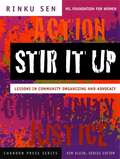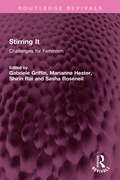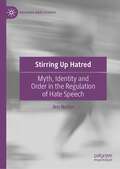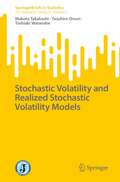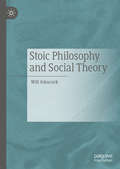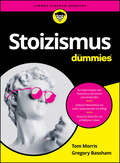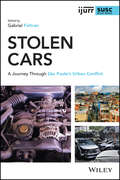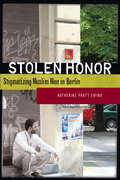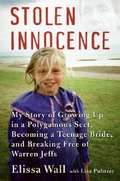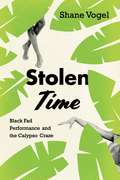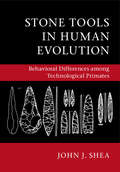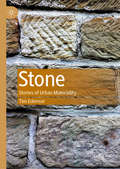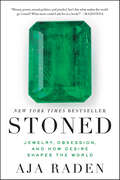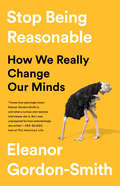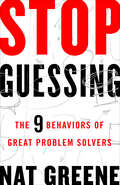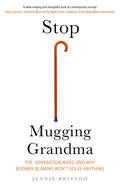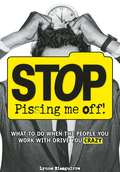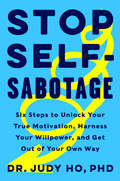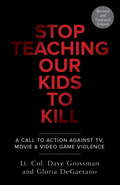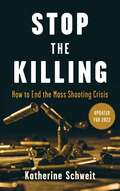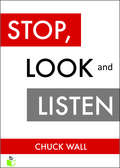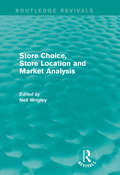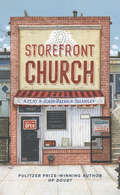- Table View
- List View
Stir it Up: Lessons in Community Organizing and Advocacy
by Rinku SenStir It Up--written by renowned activist and trainer Rinku Sen--identifies the key priorities and strategies that can help advance the mission of any social change group. This groundbreaking book addresses the unique challenges and opportunities the new global economy poses for activist groups and provides concrete guidance for community organizations of all orientations.
Stirring It: Challenges for Feminism (Routledge Revivals)
by Gabriele Griffin Marianne Hester Sasha Roseneil Shirin RaiFirst published in 1994 Stirring It debates the challenges which confront feminism and Women's Studies in the 1990s. In the face of current worldwide political and social upheavals, Stirring It poses questions about women, their bodies, their identities, and positions which need to be addressed by contemporary feminists. The chapters therefore challenge the orthodoxies and theories which are exploded by contemporary feminist practice. They raise new issues for feminist debate. The volume is divided into four sections: ‘Feminist Politics in Action’ investigates the inter-relationship between politics and action with reference to issues such as the women's movement in Britain and women's position in and in relation to Ireland; ‘Disrupting Sexual Identities’ provides critiques of heterosexuality, monogamy, and conceptualization of the female body; ‘Imaging and Imagining’ explores the politics of women's cultural production and ‘Women's Studies and Feminist Practice’ analyzes the often fraught connections between theory and practice. This is a must read for scholars and researchers of Women's Studies, Sociology, and Gender Studies.
Stirring Up Hatred: Myth, Identity and Order in the Regulation of Hate Speech (Palgrave Hate Studies)
by Jen NellerThis book critically examines the development of the ‘stirring up hatred’ offences which are currently found within the UK’s Public Order Act 1986. Through a critical discourse analysis of key excerpts of parliamentary Hansard, the book constructs a detailed genealogy of the offences from the perspectives that shaped them. A novel application of theory on 'myth' is used to navigate the complex arguments and to trace ideas about identity and order across parliamentary debates, from fears of Fascism in the 1930s to condemnations of homophobia in the early 21st century. The story of the stirring up hatred offences told in this book therefore extends far beyond the traditional frame of a dilemma between regulating hate speech and safeguarding free speech: it is inextricably entwined with myths about law, race and national identity, and speaks to wider themes of coloniality, neoliberalism, white entitlement, British-Christian exceptionalism and the innocence of law. Written in an accessible and engaging style, this book challenges a wide range of assumptions about hate speech law and raises a series of considerations for developing forms of accountability that are less complicit in the harms that they are supposed to redress.
Stochastic Volatility and Realized Stochastic Volatility Models (SpringerBriefs in Statistics)
by Makoto Takahashi Yasuhiro Omori Toshiaki WatanabeThis treatise delves into the latest advancements in stochastic volatility models, highlighting the utilization of Markov chain Monte Carlo simulations for estimating model parameters and forecasting the volatility and quantiles of financial asset returns. The modeling of financial time series volatility constitutes a crucial aspect of finance, as it plays a vital role in predicting return distributions and managing risks. Among the various econometric models available, the stochastic volatility model has been a popular choice, particularly in comparison to other models, such as GARCH models, as it has demonstrated superior performance in previous empirical studies in terms of fit, forecasting volatility, and evaluating tail risk measures such as Value-at-Risk and Expected Shortfall. The book also explores an extension of the basic stochastic volatility model, incorporating a skewed return error distribution and a realized volatility measurement equation. The concept of realized volatility, a newly established estimator of volatility using intraday returns data, is introduced, and a comprehensive description of the resulting realized stochastic volatility model is provided. The text contains a thorough explanation of several efficient sampling algorithms for latent log volatilities, as well as an illustration of parameter estimation and volatility prediction through empirical studies utilizing various asset return data, including the yen/US dollar exchange rate, the Dow Jones Industrial Average, and the Nikkei 225 stock index. This publication is highly recommended for readers with an interest in the latest developments in stochastic volatility models and realized stochastic volatility models, particularly in regards to financial risk management.
Stoic Philosophy and Social Theory
by Will JohncockThis book puts recently re-popularized ancient Stoic philosophy in discussion with modern social theory and sociology to consider the relationship between an individual and their environment. Thirteen comparative pairings including Epictetus and Émile Durkheim, Zeno and Pierre Bourdieu, and Marcus Aurelius and George Herbert Mead explore how to position individualism within our socialized existence. Will Johncock believes that by integrating modern perspectives with ancient Stoic philosophies we can question how internally separate from our social environment we ever are. This tandem analysis identifies new orientations for established ideas in Stoicism and social theory about the mind, being present, self-preservation, knowledge, travel, climate change, the body, kinship, gender, education, and emotions.
Stoizismus für Dummies (Für Dummies)
by Tom Morris Gregory BasshamDie Kunst der stoischen Ruhe In einer hektischen Welt geprägt von Reizüberflutung und endlosen To-Do-Listen gibt es ein jahrhundertealtes Gegenmittel: Stoizismus. Entdecken Sie eine zeitlose Philosophie, die Ihnen einen Weg zur inneren Ruhe und mehr Gelassenheit aufzeigt. Spannendes Hintergrundwissen und zahlreiche Lebensweisheiten helfen Ihnen, mit den Herausforderungen des Alltags gelassener umzugehen. Mit Gelassenheit und „stoischer Ruhe“ lassen sich Hürden, aber auch Sinnfragen viel besser bewältigen. Lernen Sie mit Stoizismus für Dummies wertvolle Weisheiten kennen, die sich schon jahrhundertelang bewährt haben und Ihnen einen Leitfaden für ein erfülltes und glückliches Leben bieten. Sie erfahren Wie Ihnen Stoizismus durch den Dschungel des Lebens helfen kann Wie Sie stoische Prinzipien einfach und effektiv anwenden Warum Stoizismus aktueller denn je ist
Stolen Cars: A Journey Through São Paulo's Urban Conflict (IJURR Studies in Urban and Social Change Book Series)
by Gabriel FeltranStolen Cars is an innovative ethnography of urban inequalities and violence in São Paulo, Brazil. Organized around the journeys of five stolen cars, each chapter discusses a specific theme, such as the distinctions between violent robbery and the more commercial non-violent theft or the role of national borders interconnecting illegal and legal economies Provides an original theoretical framework for a rarely studied urban and transnational supply chain Draws from empirical data and a combination of different methodologies to demonstrate mechanisms of urban inequalities and violence reproduction Highlights how everyday life is entangled with structural urban transformations Uses an ethnographic narrative to show how urban development produce various forms of illegality and violent crime
Stolen Honor
by Katherine Pratt EwingThe covered Muslim woman is a common spectacle in Western media-a victim of male brutality, the oppressed and suffering wife or daughter. And the resulting negative stereotypes of Muslim men, stereotypes reinforced by the post-9/11 climate in which he is seen as a potential terrorist, have become so prominent that they influence and shape public policy, citizenship legislation, and the course of elections across Europe and throughout the Western world. In this book, Katherine Pratt Ewing asks why and how these stereotypes-what she terms "stigmatized masculinity"-largely go unrecognized, and examines how Muslim men manage their masculine identities in the face of such discrimination. The author focuses her analysis and develops an ethnographic portrait of the Turkish Muslim immigrant community in Germany, a population increasingly framed in the media and public discourse as in crisis because of a perceived refusal of Muslim men to assimilate. Interrogating this sense of crisis, Ewing examines a series of controversies-including honor killings, headscarf debates, and Muslim stereotypes in cinema and the media-to reveal how the Muslim man is ultimately depicted as the "abjected other" in German society.
Stolen Innocence: My Story of Growing Up in a Polygamous Sect, Becoming a Teenage Bride, and Breaking Free of Warren Jeffs
by Lisa Pulitzer Elissa WallWall tells the incredible and inspirational story of how she emerged from the confines of the Fundamentalist Church of Latter Day Saints (FLDS) and helped bring one of America's most notorious criminals to justice. Detailing how Jeffs's influence over the church twisted its already rigid beliefs in dangerous new directions, Wall portrays the inescapable mindset and unrelenting pressure that forced her to wed despite her repeated protests that she was too young.
Stolen Time: Black Fad Performance and the Calypso Craze
by Shane VogelIn 1956 Harry Belafonte’s Calypso became the first LP to sell more than a million copies. For a few fleeting months, calypso music was the top-selling genre in the US—it even threatened to supplant rock and roll. Stolen Time provides a vivid cultural history of this moment and outlines a new framework—black fad performance—for understanding race, performance, and mass culture in the twentieth century United States. Vogel situates the calypso craze within a cycle of cultural appropriation, including the ragtime craze of 1890s and the Negro vogue of the 1920s, that encapsulates the culture of the Jim Crow era. He follows the fad as it moves defiantly away from any attempt at authenticity and shamelessly embraces calypso kitsch. Although white calypso performers were indeed complicit in a kind of imperialist theft of Trinidadian music and dance, Vogel argues, black calypso craze performers enacted a different, and subtly subversive, kind of theft. They appropriated not Caribbean culture itself, but the US version of it—and in so doing, they mocked American notions of racial authenticity. From musical recordings, nightclub acts, and television broadcasts to Broadway musicals, film, and modern dance, he shows how performers seized the ephemeral opportunities of the fad to comment on black cultural history and even question the meaning of race itself.
Stone Tools in Human Evolution
by John J. SheaIn Stone Tools in Human Evolution, John J. Shea argues that over the last three million years hominins' technological strategies shifted from occasional tool use, much like that seen among living non-human primates, to a uniquely human pattern of obligatory tool use. Examining how the lithic archaeological record changed over the course of human evolution, he compares tool use by living humans and non-human primates and predicts how the archaeological stone tool evidence should have changed as distinctively human behaviors evolved. Those behaviors include using cutting tools, logistical mobility (carrying things), language and symbolic artifacts, geographic dispersal and diaspora, and residential sedentism (living in the same place for prolonged periods). Shea then tests those predictions by analyzing the archaeological lithic record from 6,500 years ago to 3. 5 million years ago.
Stone: Stories of Urban Materiality
by Tim EdensorIn undertaking a systematic analysis of urban materiality, this book investigates one kind of material in Melbourne: stone. The work draws on a range of pertinent, current theories that consider materiality, assemblages, networks, phenomenology, resource and extraction geographies, memorialisation, maintenance and repair, place identity, skill, sensation and affect, haunting and the vitalism of the non-human. In appealing to the general reader, academics and students, this book provides a highly readable account, replete with evocative examples and fascinating historical and contemporary stories about stone in Melbourne.
Stoned: Jewelry, Obsession, and How Desire Shapes the World
by Aja RadenAs entertaining as it is incisive, Stoned is a raucous journey through the history of human desire for what is rare, and therefore precious.What makes a stone a jewel? What makes a jewel priceless? And why do we covet beautiful things? In this brilliant account of how eight jewels shaped the course of history, jeweler and scientist Aja Raden tells an original and often startling story about our unshakeable addiction to beauty and the darker side of human desire.What moves the world is what moves each of us: desire. Jewelry—which has long served as a stand-in for wealth and power, glamor and success—has birthed cultural movements, launched political dynasties, and started wars. Masterfully weaving together pop science and history, Stoned breaks history into three categories—Want, Take, and Have—and explains what the diamond on your finger has to do with the GI Bill, why green-tinted jewelry has been exalted by so many cultures, why the glass beads that bought Manhattan for the Dutch were initially considered a fair trade, and how the French Revolution started over a coveted necklace.Studded with lively personalities and fascinating details, Stoned tells the remarkable story of our abiding desire for the rare and extraordinary.
Stop Being Reasonable: How We Really Change Our Minds
by Eleanor Gordon-SmithA thought-provoking exploration of how people really change their minds, and how persuasion is possible. In Stop Being Reasonable, Eleanor Gordon-Smith weaves a narrative that illustrates the limits of human reason. Here, she tells the stories of people who have radically altered their beliefs--from the woman who had to reckon with her husband's terrible secret to the man who finally left the cult he had been raised in since birth. Gordon-Smith shows how we can change the course of our own lives, and asks: what made someone change course? How should their reversals affect how we think about our own beliefs? And in an increasingly divided world, what do they teach us about how we might change the minds of others?Inspiring, perceptive, and moving, Stop Being Reasonable explores why resistance to evidence is often rooted in self-preservation and fear, why we feel shame in admitting we are wrong, and why who we believe is often more important than what we believe. This fascinating book will completely change the way you look at the power of persuasion.
Stop Guessing: The 9 Behaviors of Great Problem Solvers
by Nat GreeneBecome the greatest problem solver you can be!Bad problem solving costs individuals and society incalculable amounts of time, money, and sanity. In this book Nat Greene—who's been solving hard problems professionally for over twenty years—shares nine behaviors anyone can adopt to find solutions to even the most seemingly intractable problems.The problem with most problem solving, Greene says, is that it's not problem solving at all: it's guessing. We have an idea of what might work and we try it out. If that doesn't work, we try something else. And so on. It's inefficient at best, and with really hard problems there are simply too many variables for guessing to work. Greene shows you how to adopt the behaviors great problem solvers use to arrive at solutions efficiently—without guessing. He illustrates them with examples ranging from everyday issues like fixing a malfunctioning garage door to stopping frequent breakdowns at a chemical plant (saving millions of dollars) to addressing the scourge of poverty in sub-Saharan Africa. So stop guessing and start solving today!
Stop Mugging Grandma: The 'Generation Wars' and Why Boomer Blaming Won't Solve Anything
by Jennie BristowA decisive intervention in the "war" between generations, asking who stands to gain from conflict between baby boomers and millennials Millennials have been incited to regard their parents’ generation as entitled and selfish, and to blame the baby boomers of the Sixties for the cultural and economic problems of today. But is it true that young people have been victimized by their elders? In this book, Jennie Bristow looks at generational labels and the groups of people they apply to. Bristow argues that the prominence and popularity of terms like "baby boomer," "millennial," and "snowflake" in mainstream media operates as a smoke screen—directing attention away from important issues such as housing, education, pensions, and employment. Bristow systematically disputes the myths that surround the "generational war," exposing it to be nothing more than a tool by which the political and social elite can avoid public scrutiny. With her lively and engaging style, Bristow highlights the major issues and concerns surrounding the sociological blame game.
Stop Pissing Me Off
by Lynne EisaguirreThis is a nitty-gritty, witty and concise book for anyone who is fed up with another person in any kind of work situation. This is a field guide for everyday people in the trenches at all levels of business who need to understand the underlying reasons for difficult people, manage those difficulties, work productively with a diverse work force, and transform work misery into productivity. It shows readers how to get results--even from people they can't stand, put themselves in someone else's shoes, stand up for themselves as appropriate, and more importantly, control their temper.
Stop Pissing Me Off: What to Do When the People You Work with Drive You Crazy
by Lynne EisaguirreThis is a nitty-gritty, witty and concise book for anyone who is fed up with another person in any kind of work situation. This is a field guide for everyday people in the trenches at all levels of business who need to understand the underlying reasons for difficult people, manage those difficulties, work productively with a diverse work force, and transform work misery into productivity. It shows readers how to get results--even from people they can't stand, put themselves in someone else's shoes, stand up for themselves as appropriate, and more importantly, control their temper.
Stop Pissing me off!
by Lynne EisaguirreStop Pissing Me Off! gives you the essential, no-nonsense advice you need to negotiate conflicts and deal with problem people in the workplace.
Stop Self-Sabotage: Six Steps to Unlock Your True Motivation, Harness Your Willpower, and Get Out of Your Own Way
by Judy Ho, PhD PhDAward-winning clinical psychologist and TV personality Dr. Judy Ho helps you stop the cycle of self-sabotage, clear a path to lasting happiness, and start living your best life in this a must-have guide perfect for fans of You Are a Badass, Unf*ck Yourself, and How to Stop Feeling Like Sh*t. Have you ever had a deadline for a big work project, only to find yourself down to the wire because you spent too much time on social media? Or gotten excited about meeting someone new, only to convince yourself he isn’t really interested? How many Januarys have you resolved that this is the year you’re finally going to lose the weight, only to abandon your diet in just a few weeks? If these scenarios sound familiar, you are stuck in a cycle of self-sabotage.At one point or another, we’ve all done something that undermines our best interests and intentions. Even the most successful people get in their own way—often without realizing it. In Stop Self-Sabotage, licensed clinical psychologist, tenured professor, and television personality Dr. Judy Ho takes a fresh look at self-sabotage to help us answer two vital questions: Why do we do it? How do we stop? Combining therapeutically proven strategies with practical tools and self-assessments, Dr. Judy teaches you how to identify your triggers, modify your thoughts and behaviors, find your true motivation, and unlock your willpower to stop this vicious cycle in its tracks. Practical and transformative, Stop Self-Sabotage is your ultimate guide to jumpstart lasting, positive change and start living the life you want.
Stop Teaching Our Kids To Kill, Revised and Updated Edition
by Gloria Degaetano Lt. Col. Dave GrossmanCompletely revised and updated, a much-needed call to action for every parent, teacher, and citizen to help our children and stop the wave of killing and violence gripping America's youth Newtown, Aurora, Virginia Tech, Columbine. Thereis no bigger or more important issue in America than youth violence. Kids, some as young as ten years old, take up arms with the intention to murder. Why is this happening? Lt. Col. Dave Grossman and Gloria DeGaetano believe the root cause is the steady diet of violent entertainment kids see on TV, in movies, and in the video games they play--witnessing hundreds of violent images a day. Offering incontrovertible evidence based on recent scientific studies and research, they posit that this media is not just conditioning children to be violent and see killing as acceptable but teaching them the mechanics of killing as well. Stop Teaching Our Kids to Kill supplies the statistics, interprets the copious research that exists on the subject, and suggests the many ways to make a difference in your home, at school, in your community, in the courts, and in the larger world. In using this book, parents, educators, social-service workers, youth advocates, and anyone interested in the welfare of our children will have a solid foundation for effective action and prevention of future Columbines, Jonesboros, and Newtowns.
Stop the Killing: How to End the Mass Shooting Crisis
by Katherine SchweitStop the Killing offers insight into what each of us can do to end the active shooter crisis plaguing America. Written by the former head of the FBI’s active shooter program, Katherine Schweit, shares an insider look at what we’ve learned, and failed to learn, about protecting our businesses, houses of worship, and schools. <p><p>The book demystifies the language around active shooters, mass killings, threat assessment teams, and more. Never gathered before into one place, readers gain access to evidence-based research and the most up-to-date information as they travel step-by-step through shooting prevention efforts and shooting aftermaths. Beginning with an understanding of how to spot potential shooters, readers learn the many ways to prevent shootings and the role threat assessment teams play. Threat assessment experts provide insight on what kind of information they need, and how they use it to intercept a person on a pathway to violence. The book guides readers through the process of assessing building security weaknesses and shows how to find vulnerabilities in people, programs, and policies. Packed with practical advice for training every age, from preschoolers, to elementary school children, to adults, the book also includes the author’s own teaching outline on how to train people to run, hide, fight. The book gathers together examples to help build individualized emergency operations plans and shows how to tap vast government resources to cover costs to your office and employees, districts and students, and survivors and victim’s families. Hear sober advice gathered from those who have survived and responded to shootings at Columbine High School, Virginia Tech, Sandy Hook Elementary School, the Aurora theater, Los Angeles International Airport, and more. Their common theme is that it can happen anywhere and has. All the more reason to accept that as each of us better understand what happens and how to prevent it, we can be the ones to stop the killing. <p><P> The book also features a new preface exploring the 2021 school shooting tragedy in Michigan, especially the groundbreaking use of a domestic terrorism charge filed against the shooter and involuntary manslaughter charges filed against his parents.
Stop, Look, & Listen: The Customer CEO Business Fable About How to Profit from the Power of Your Customers
by Chuck WallSales have dropped precipitously. The board is meeting next week. Bob, founder and long-time CEO, is urged by his team to hire an expensive management consulting firm and drastically cut costs as a last ditch effort to improve the company's bottom line.Stop, Look, and Listen is the story of how Bob puts the principles put forth in Chuck Wall's Customer CEO: How to Profit from the Power of Your Customers to work. Bob has been running his company as if he controls the customers. Bob is urged to Stop, Look, and Listen, because today, the customers are in control. They are the bosses, the Customer CEOs, and they control the company's destiny.Bob must learn to understand his customers' needs, and more importantly, embrace their power. The three essential steps are to STOP seeing things from the corporate CEO's point of view, LOOK at everything from the customer's point of view, even when it hurts, and LISTEN deeply for what the customers' needs are. This short, entertaining business tale chronicles Bob's ultimate recognition of his customers as CEOs.Author Chuck Wall is an expert in understanding the needs of customers, having interviewed and surveyed more than 100,000 of them in virtually every business category. Chuck has helped hundreds of companies, from the Fortune 100 to start-ups, acquire hundreds of thousands of new customers.
Store Choice, Store Location and Market Analysis (Routledge Revivals)
by Neil WrigleyThis book, first published in 1988, brings together leading researchers from both the retailing business and the academic world to discuss the latest techniques of analysis and forecasting in the fields of store choice, store location, and market analysis. Its rationale is the major restructuring of the UK retailing industry which has taken place over the past twenty years, and the profound implications of that restructuring for the type of research necessary to understand, maintain and enhance corporate responsibility. The contributors present accounts of the development of new and original methods for retail analysis and forecasting purposes. They lay stress upon practical methods which are accurate and robust, and which can operate with the type of data typically available to retailers. The book will provide a major work of reference for retailers, market researchers, retail analysts, estate managers, urban planners and geographers in many countries.
Storefront Church
by John Patrick Shanley"Some of Shanley's sharpest comic writing in years... His intense engagement with questions of religion and ethics remains distinctive and invigorating." - Charles Isherwood, New York Times"There's a deeper philosophical vein that the author mines, allowing his language to acquire the heft and timbre of a serious moral debate...We taste bitterness, but also much that is sweet." - David Cote, TimeOut New York"A postmodern morality play that's as funny as it is bracing." - Karen D'Souza, San Jose Mercury NewsConcluding the "Church and State" trilogy of plays that began with Doubt and Defiance, Storefront Church tells the story of a Bronx Borough President who is forced by the mortgage crisis into a confrontation with a local minister. Blending earthy humor and philosophical reflection, this compassionate morality tale is an exploration of the often thorny relationship between spiritual experience and social action.John Patrick Shanley is the author of Doubt: A Parable (Pulitzer Prize for Drama, Tony Award for Best Play), Outside Mullingar (Tony nomination for Best Play), Defiance, Danny and the Deep Blue Sea and Dirty Story, among many other plays. He wrote the teleplay for Live from Baghdad (Emmy nomination for Outstanding Writing of a Miniseries, Movie or Dramatic Special) and the screenplays for Congo, Alive, Five Corners, Joe Versus the Volcano, Doubt (Academy Award nomination for Best Adapted Screenplay) and Moonstruck (Academy Award for Best Original Screenplay).
